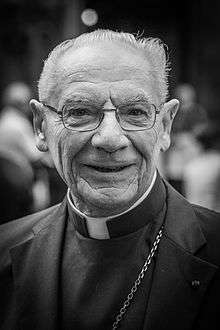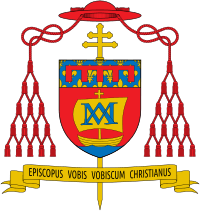Paul Poupard

Paul Joseph Jean Poupard (born 30 August 1930 in Bouzillé, Maine-et-Loire) is a French prelate of the Catholic Church who has been a Cardinal since 1985. He held positions in the Roman Curia for more than 25 years, serving as President of the Pontifical Council for Culture from 1988 to 2007 and briefly as President of the Pontifical Council for Interreligious Dialogue.
| Styles of Paul Poupard | |
|---|---|
 | |
| Reference style | His Eminence |
| Spoken style | Your Eminence |
| Informal style | Cardinal |
| See | Santa Prassede (titular) |
Biography
Poupard was born in Bouzillé, Maine-et-Loire, and raised in a very Catholic family and culture. Heavily influenced by his pastor, to whom Poupard credits his vocation, he studied at the minor seminary in Beaupréau, University of Angers, and École Pratique des Hautes Études of the Sorbonne (from where he obtained his doctorates in theology and history). Poupard was ordained to the priesthood by Bishop Stanislas Courbe on 18 December 1954, and then taught at the Mongazon School. After entering the French section of the Secretariat of State in 1959, he was raised to the rank of Chaplain of His Holiness on 20 March 1965, and of Honorary Prelate of His Holiness on 29 November 1971. Poupard was Rector of the Institut Catholique de Paris from 1972 to 1980, and also served as Vice-President of the Society of French Ecclesiastical History.
On 2 February 1979, he was appointed Auxiliary Bishop of Paris and Titular Bishop of Usula. Poupard received his episcopal consecration on the following 6 April from Cardinal François Marty, with Archbishop André Pailler and Bishop Jean Orchampt serving as co-consecrators, in the Church of Saint-Germain-des-Prés. A year and a half later, in 1980, he received a position in the Roman Curia, the Holy See's governing body, as Pro-President of the Secretariat for Non-Believers, later (in 1988) renamed the Pontifical Council for Culture. In 1985, his title was changed to president, on his becoming Cardinal-Deacon of S. Eugenio. After the sede vacante period that followed the death of Pope John Paul II, Pope Benedict XVI immediately reappointed him to the same position and on 11 March 2006 also named him President of the Pontifical Council for Interreligious Dialogue.
Poupard has been interested in the relationships between faith and reason, Church and state, and science and religion from an early age. He is an accomplished scholar and author. Some of his writings have been translated into languages including Arabic, Bulgarian, Chinese, Croatian, English, German, Hungarian, Italian, Japanese, Korean, Portuguese, Russian, and Spanish. He holds doctorates in theology and history from the Sorbonne, as well as honorary doctorates from at the Universities of Aix-en-Provence, Fu Jen, Louvain, Kyoto, Santiago de Chile, Puebla de los Angeles and the Babes-Bolyai University/Cluj-Napoca.
In 1996 he was appointed Cardinal-Priest of Santa Prassede. He was one of the cardinal electors who participated in the 2005 papal conclave that elected Pope Benedict XVI.
In September 2007 Pope Benedict replaced him as President of the Pontifical Council for Interreligious Dialogue with Cardinal Jean-Louis Tauran and as President of the Pontifical Council for Culture with Gianfranco Ravasi.
References
External links
- "Poupard Card. Paul". Holy See Press Office. Archived from the original on 4 September 2017. Retrieved 9 November 2017.
- Bio
- Speech - 27 June 2001 (Archived: 8 February 2007)
- Pontifical Council for Culture (Dicastery presided over by Cardinal Poupard)
| Catholic Church titles | ||
|---|---|---|
| Preceded by Gabriel-Marie Garrone |
President of the Pontifical Council for Culture 19 April 1988 – 3 September 2007 |
Succeeded by Gianfranco Ravasi |
| Preceded by Michael L. Fitzgerald |
President of the Pontifical Council for Interreligious Dialogue 11 March 2006 – 1 September 2007 |
Succeeded by Jean-Louis Tauran |